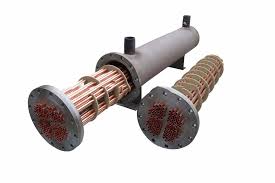EVAPORATOR
Evaporator is a device used in refrigeration and air conditioning systems to absorb heat from its surroundings and evaporate a refrigerant. It operates by allowing the refrigerant, in liquid form, to evaporate into a gas through a series of coils or tubes. This phase change absorbs heat from the surrounding air or fluid, cooling the environment. Evaporators are crucial components in cooling systems, facilitating the transfer of heat and enabling the efficient operation of refrigeration cycles.

Advantages of Evaporator in Chiller
- Efficient Heat Transfer: They facilitate effective heat transfer due to the phase change of the refrigerant from liquid to gas, which absorbs heat from the surroundings.
- Energy Efficiency: Evaporators are typically energy-efficient because they operate by utilizing the latent heat of vaporization, requiring less energy input for cooling.
- Compact Design: They can be designed in compact configurations, making them suitable for various applications where space is limited.
- Versatility: Evaporators are used in a wide range of applications, including refrigeration, air conditioning, and industrial processes, due to their ability to cool liquids and gases efficiently.
- Lower Operating Costs: Compared to other cooling methods, evaporators often have lower operating costs, especially in terms of energy consumption and maintenance.
- Environmental Friendliness: Many evaporators use refrigerants that are less harmful to the environment, contributing to sustainability efforts.
Role of Evaporators in Chillers
- Heat Absorption: The evaporator absorbs heat from the chilled water or other fluid circulating through it.
- Phase Change: It facilitates the phase change of the refrigerant from liquid to vapor as it absorbs heat from the chilled fluid.
- Cooling Effect: By removing heat from the chilled fluid, the evaporator lowers its temperature, providing chilled water or air for cooling applications.
- Efficient Operation: Evaporators ensure that the refrigerant absorbs heat efficiently, enabling the chiller to maintain the desired temperature in the cooling loop.
- Temperature Control: They play a crucial role in controlling and maintaining the temperature of the chilled water or air output from the chiller.
- Cycle Completion: The evaporator completes the refrigeration cycle by releasing cooled refrigerant back to the compressor to continue the cooling process.
